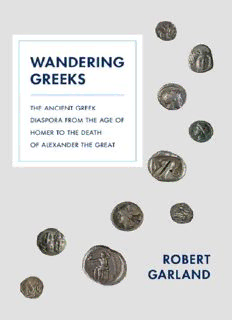
Wandering Greeks: The Ancient Greek Diaspora from the Age of Homer to the Death of Alexander the Great PDF
Preview Wandering Greeks: The Ancient Greek Diaspora from the Age of Homer to the Death of Alexander the Great
WANDERING GREEKS WANDERING GREEKS The Ancient Greek Diaspora from the Age of Homer to the Death of Alexander the Great Robert Garland Princeton University Press Princeton and Oxford Copyright © 2014 by Princeton University Press Published by Princeton University Press, 41 William Street, Princeton, New Jersey 08540 In the United Kingdom: Princeton University Press, 6 Oxford Street, Woodstock, Oxfordshire OX20 1TW press.princeton.edu Coin photography © Andy Daddio. Jacket design by Karl Spurzem. All Rights Reserved Library of Congress Cataloging-in-Publication Data Garland, Robert, 1947– Wandering Greeks : the ancient Greek diaspora from the age of Homer to the death of Alexander the Great / Robert Garland. pages cm Summary: “Most classical authors and modern historians depict the ancient Greek world as essentially stable and even static, once the so-called colonization movement came to an end. But Robert Garland argues that the Greeks were highly mobile, that their movement was essential to the survival, success, and sheer sustainability of their society, and that this wandering became a defining characteristic of their culture. Addressing a neglected but essential subject, Wandering Greeks focuses on the diaspora of tens of thousands of people between about 700 and 325 BCE, demonstrating the degree to which Greeks were liable to be forced to leave their homes due to political upheaval, oppression, poverty, warfare, or simply a desire to better themselves. Attempting to enter into the mind-set of these wanderers, the book provides an insightful and sympathetic account of what it meant for ancient Greeks to part from everyone and everything they held dear, to start a new life elsewhere—or even to become homeless, living on the open road or on the high seas with no end to their journey in sight. Each chapter identifies a specific kind of “wanderer,” including the overseas settler, the deportee, the evacuee, the asylum-seeker, the fugitive, the economic migrant, and the itinerant, and the book also addresses repatriation and the idea of the “portable polis.” The result is a vivid and unique portrait of ancient Greece as a culture of displaced persons”—Provided by publisher. Includes bibliographical references and index. ISBN 978-0-691-16105-1 (hardback) 1. Greeks—Migrations—History—To 1500. 2. Greece— Social conditions—To 146 B.C. 3. Greece—Civilization—To 146 B.C. I. Title. DF222.2.G37 2014 938—dc23 2013034456 British Library Cataloging-in-Publication Data is available This book has been composed in Sabon Next LT Pro and Ideal Sans Printed on acid-free paper. Printed in the United States of America 10 9 8 7 6 5 4 3 2 1 for Paul with lasting affection ῖ ᾽ ἔτι ξυνὴ άντων γα α δ π — Earth is common to all— —HOM. IL. 15.193 CONTENTS List of Illustrations xi List of Maps xiii Preface xv 1. Prolegomena 1 2. The Wanderer 15 3. The Settler 34 4. The Portable Polis 57 5. The Deportee 79 6. The Evacuee 99 7. The Asylum-Seeker 114 8. The Fugitive 131 9. The Economic Migrant 150 10. The Itinerant 167 11. Repatriation 181 Conclusions 197 Envoi 205 Further Reading 207 A. The Terminology of Diaspora 239 B. Catalogue of Athenian Cleruchies and Colonies 244 C. Catalogue of Deportees 253 D. Catalogue of Exiles 264 E. Catalogue of the Enslaved 271 Chronology 279 Glossary 283 Bibliography 287 Index of Personal Names 301 Index of Place Names 305 Index of Sources 309 General Index 317 ILLUSTRATIONS All coins are reproduced with kind permission of an anonymous collector. 1. Silver tetrôbolon from Histiaea, Euboea, ca. 267–146 8 2. Silver statêr from Thebes, ca. 480–56 22 3. Silver drachma from Larissa, Thessaly, ca. 365–44 35 4. Silver statêr from Anactorium, ca. 300–250 37 5. Silver triêmiôbolon from Thasos, ca. 411–350 41 6. Bronze coin from Syracuse, time of Agathocles, 319–289 69 7. Silver triôbolon from Megalopolis, ca. 175–68 77 8. Silver litra from Gela, after ca. 425 87 9. Bronze obolos from Megara, ca. 307–243 93 10. Silver tetradrachma from Athens, second half of fifth century 103 11. Bronze onkia from Camarina, ca. 420–405 112 12. Silver drachma from Rhodes, ca. 205–190 132
Description: